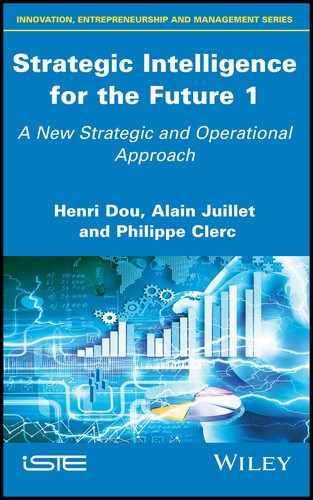Preface
Since the Public Economic Intelligence Policy (PPIE) was established in France, there have been a number of conferences, and research groups, as well as the introduction of training reference bases, including publications on the subject. However, a look at its track record shows that since the enthusiasm of its beginnings, routine has prevailed and competitive intelligence has been drawn toward concerns relating to security, leaving behind the notions of foresight, strategy, and geopolitical understanding of business, and of the institutions that they export or not.
In a world currently undergoing complete reconfiguration, where in 10 years’ time France will no longer be the sixth world power, there is a need to reconsider our vision of the reality. We need to “change our way of thinking”, and to no longer analyze the information we find easy to obtain (as is the case today) with references of the past.
We need to re-discover competitive intelligence. The objective of this book is to put competitive intelligence into a modern context of information, as well as of its strategic exploitation. We can no longer afford to remain naïve and must move from the passiveness of theory to action. Acting is, of course, applying the methods and tools of intelligence and competitive intelligence to our understanding of the business environment. But it is also about using this mix to thoroughly immerse ourselves in the methods used by our competitors to better fight on the international market.
With hindsight, we might have the impression that the initial conception of competitive intelligence has been diluted. Big companies, with their financial assets, have more or less successfully developed their own activities in this field. But, at the level of national industrial research and development programmes – clusters, regions, our research institutions, and SMEs and SMIs – competitive intelligence has neither penetrated nor taken its rightful strategic place. At an international level, this discipline has gained more and more followers, especially in the US, but also in China, Germany, South-East Asia, etc.
It is time we opened our eyes, by analyzing errors, being aware both our strengths and weaknesses. If considered to be actionable, competitive intelligence is neither espionage, documentation nor futurology. It is the way to see things more clearly, to develop a constructive and shared vision and to create a real lever for economic and industrial development. Engaged in hyper competition, an evolution is necessary, but it is not a few hundred successful start-ups that will deeply transform our industry or help it quickly reach the threshold necessary to conquer the external markets and therefore reduce the deficit of our trade balance.
The world of tomorrow is uncertain. We might be faced with new challenges posed by terrorism that need to be analyzed and forecast, as well as economic, demographic, and capitalism crises. We need to explore the future to better act in the present. It is these topics that we wanted to develop in the following nine chapters, ranging from geopolitics to competitive intelligence communities of practices, influence, spheres of influence, international cooperation, innovation, territorial intelligence.
We hope that in reading this book, readers will gain new insight and be introduced to the activities of those who already practice, or those who wish to begin, methods and ways of working that break routines and lead to action. As noted by Eric Delbecque, Competitive intelligence (CI) has persisted without ever really evolving; in fact, it has reproduced over the years without significant changes. It is this cycle that we want to break to bring competitive intelligence into a new dimension.
Henri DOU
Alain JUILLET
Philippe CLERC
January 2019
